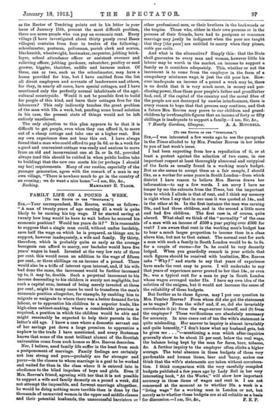[To THE EDITOR OF TRH " Sraoraros."1 SIR,—I was interested
a few weeks ago to see the paragraph in the Times alluded to by Mrs. Pember Reeves in her letter to you of last week's issue.
I had been expecting from her a repudiation of it, or at least a protest against the selection of two cases, in one important respect at least thoroughly abnormal and untypical of the facts as usually found in a working man's budget. But as she seems to accept them as a fair sample, I should like, as a worker for some years in South London—from which district I have reason to believe Mrs. Reeves draws her information—to say a few words. I am sorry I have no longer by me the extracts from the Times, but the important item to which I allude is that of rent, and I think my memory is right when I say that in one case it was quoted at 14s., and in the other at 9s. In the first instance the man was earning 20s., and had three children, and in the second a little more and had five children. The first case is, of course, quite absurd. What shall we think of the " normality " of the case of a man with an income of 2500 a year paying over 2300 for rent? I am aware that rent in the working man's budget has to bear a much larger proportion to income than in a class above him, but not to that extent. The normal rent for such a man with such a family in South London would be 4s. to 6s. for a couple of rooms—for 7s. he could be very decently lodged. When you guardedly remark in your article that such figures should be received with hesitation, Mrs. Reeves asks " Why ? " and starts to say that years of experience have made the rent easy to prove. I will undertake to say that years of experience never proved to her that 146., or even 9s., was a typical rent for a man to pay in South London whose wages averaged under 21s. I have my own idea of the solution of the enigma, but it would not increase the sense of the reliability of these budgets.
But further as to these figures, may I put one question to Mrs. Pember Reeves ? From whom did she get the statement as to wages ? From the wife P and, if so, did she invariably corroborate it (a) from the wage-earner himself, and (b) from the employer ? These verifications are absolutely necessary for accuracy. In nine cases out of ten the wife's statement is quite misleading. Her answer to inquiry is almost invariably and quite honestly," I don't know what my husband gets, but he gives me. . ."—mentioning a sum which after-inquiries generally show to be about 15 per cent. below the real wage, the balance being kept by the man for fares, beer, tobacco, &c. A further inquiry to the employer often elicits a higher average. The total absence in these budgets of these very pardonable and human items, beer and 'baccy, makes one think that the wife's statements are taken without corroboration. I think comparison with the very carefully compiled budgets published a few years ago by Lady Bell in her very interesting book, "At the Works," will show how important accuracy in these items of wages and rent is. I am not concerned at the moment as to whether 20s. a week is a "living wage" for a working man in London or not, but merely as to whether these budgets are at all reliable as a basis for discussion.—I am, Sir, itc., F. E. P.






































 Previous page
Previous page